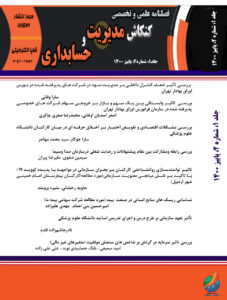مقاله: پژوهشی
صفحه: 151- 172
نویسندگان:
جعفر حصاری[1]
[1] پایان نامه کارشناسی ارشد (M.A.)، مدیریت آموزشی، دانشگاه آزاد اسلامی، واحد اردبیل، ایران
پژوهش حاضر به بررسی نقش جزم اندیشی معلمان در اعتماد سازمانی و تفکر انتقادی دانش آموزان متوسطه ناحیه 2 اردبیل می پردازد. با استفاده از جدول نمونه گیری مورگان تعداد 357 نفر به عنوان نمونه انتخاب می گردد. روش نمونه گیری تصادفی طبقه ای می باشد. ابزار گردآوری اطلاعات پرسشنامه استاندارد می باشد. جهت تجزیه و تحلیل داده ها از ضریب همبستگی پیرسون و رگرسیون چند متغیره استفاده گردید. نتایج به دست آمده نشان می دهد به جز مولفه بدبینی بقیه مولفه های جزم اندیشی از میانگین مفهومی کمتر برخوردار است. به این معنی که از دیدگاه دانش آموزان، معلمان مورد بررسی کمتر دچار جزم اندیشی هستند. اعتماد سازمانی دانش آموزان در حد متوسط قرار دارد. بیشترین اعتماد به معلمان و کمترین اعتماد به دانش آموزان می باشد. تفکر انتقادی نیز در حد متوسط به بالا می باشد. آزمون فرضیه ها حاکی از تایید فرضیه های پژوهش می باشد. نتایج ضریب همبستگی نشان می دهد تمام مولفه های جزم اندیشی با تفکر انتقادی همبستگی معکوس و معنادار دارد. بیشترین همبستگی مربوط به بدبینی می باشد. همچنین رگرسیون چندگانه نشان داد از بین مولفه های جزم اندیشی، خودرای بودن و مقاومت در برابر تغییر بیش از سایر متغیر از قدرت تبیین برخوردار هستند. با توجه به نقش معنادار و منفی جزم اندیشی در اعتماد سازمانی و تفکر انتقادی به نظر می رسد توجه به این مساله در بین معلمان بایستی یکی از اولویت های برنامه های ارتقاء مهارتهای معلمان باشد.
کلمات کلیدی:جزم اندیشی، تفکر انتقادی، اعتماد سازمانی.
The role of teachers’ dogmatic thinking in the organizational trust and critical thinking of high school students in the 2nd district of Ardabil
Jafar Hissari[1]
